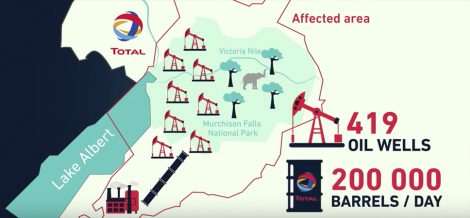Four organizations from Uganda and two from France filed a lawsuit against oil giant Total in French court on Wednesday, accusing the company of not taking the necessary measures to respect human rights and the environment in its oil megaproject in Uganda.
To make way for exploratory works for oil drilling, Total evicted approximately 5000 people from their lands, before giving limited compensation. The families could not grow any crops for over a year and a half, resulting in hunger and impoverishment.
In addition, local communities state that they signed away their lands under pressure and intimidation, and that the compensation they received is not enough to buy new lands. What is even more concerning is that Total is reproducing this modus operandi with tens of thousands more people from the communities surrounding the project site.
The case was brought to justice by Friends of the Earth France and French NGO Survie, alongside Friends of the Earth Uganda and Ugandan groups Afiego, Cred and Navoda,. This comes after two unsuccessful attempts by the Ugandan organizations to have their case heard by a national court.
The case is historic in France, representing the first time a lawsuit is brought under the Duty of Vigilance Law, passed in 2017 [1] thanks to the pressure of many civil society organizations. The first hearing is due to take place on 8 January 2020 and the case was filed as “urgent” due to the delicate situation experienced by the Ugandan communities displaced from their lands.
Environmental federation Friends of the Earth International issued a press release [2] about the case on Wednesday. The federation’s Chair, Karin Nansen, highlighted the importance of this lawsuit for the “global movement to end corporate impunity [3]”.
French corporation Total is the main operator of a oil megaproject in Lake Albert and Murchison Falls, a protected natural park in Uganda and an extremely biodiverse area. Total plans to drill over 400 wells, extracting around 200,000 barrels of oil per day.
In addition, they plan to build a 1,445 km-long giant pipeline to transport the oil, impacting communities and nature in Uganda and Tanzania, countries through which the pipelines will have to be built in order to reach the Indian Ocean.
Activist Dickens Kamugisha, of Afiego, spoke to Real World Radio about the families evicted by the project. He explained that local communities depend on their lands to grow food to eat and sell, and to access water and wood to be used as energy source. The environmental activist added that the inhabitants who agreed to sell their lands received extremely low payments in return.
“As a result most of the communities are now desperate. They have moved away from their own land because they can’t use it, they can’t get food. Others can no longer access some of the social services. They are now living with relatives. There is a lot of suffering”, stressed Dickens.
In 2014, and again in April 2019, the Ugandan organizations filed a lawsuit in a national court, without success. So, they decided to join with French organizations to file the case in a French court. “We don’t hope that we are going to get justice in Uganda”, he regretted.
Meanwhile, Juliette Renaud, corporate accountability senior campaigner for Friends of the Earth France, explained to Real World Radio that the French Law on the Duty of Vigilance forces corporate headquarters based in France to identify, prevent and remedy human rights and environmental violations caused by their activities, but also the activities of their subsidiaries and contractors, in France and in any other country of the world.
The complainants consider that Total has breached the new regulation on several aspects related to vigilance and prevention measures to ensure the respect for human rights and environmental protection .
In June, the organizations sent Total a formal demand, following the protocol to avoid the case reaching the courts. In the demand, they presented evidence of the human rights violations perpetrated by the corporation in the oil project in Uganda and the risk of huge environmental destruction. Total responded by the end of September denying their responsibility.
10,000 people have already signed the online petition [4] to support the case — “Total, see you in court!”. Juliette also told Real World Radio that the support of people around the world is fundamental to exert pressure against a powerful corporation which will use all of its might to defend itself.
For more information: www.totalincourt.org [5]
And the video:
